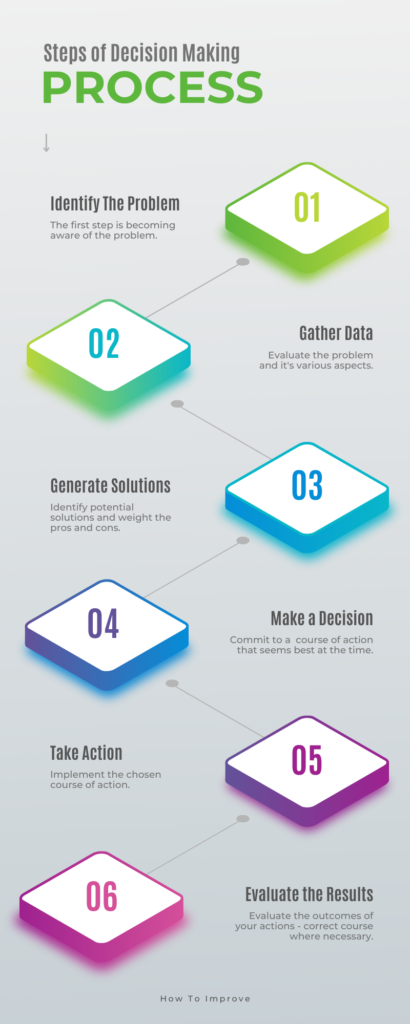How to improve decision-making skills in life? In the journey of life, decision-making is an indispensable skill.
Whether you’re choosing a career path, making financial investments, or deciding what to have for dinner, your ability to make effective decisions plays a crucial role in shaping your future.
Fortunately, decision-making skills can be honed and improved over time.
In this article, we will explore the intricacies of decision-making, different types of decisions, and techniques to enhance your decision-making skills.
Decision-making is the process of selecting the best course of action from multiple alternatives. It’s a cognitive skill that influences various aspects of our lives, including personal, professional, and social spheres.
Learning to make better decisions can lead to a more fulfilling and successful life.
Decision-Making Meaning

Before delving into the methods of improving decision-making, it’s essential to understand the meaning of decision-making.
Decision-making involves assessing available options, gathering relevant information, evaluating potential outcomes, and choosing the most suitable option. It’s a dynamic process that requires critical thinking and analysis.
Types of Decisions
- Routine Decisions: These are everyday choices that require minimal deliberation, such as what to wear or eat for breakfast.
- Strategic Decisions: These decisions have a significant impact and often involve long-term planning, like selecting a career or purchasing a home.
- Tactical Decisions: Tactical decisions are about the short-term execution of strategies and plans, such as daily work assignments.
- Operational Decisions: These decisions deal with day-to-day tasks and processes within an organization.
How To Improve Decision-Making Skills As A Leader

Effective decision-making is a crucial skill for business leaders and managers of their organizations. Indecision can lead to problems, so sharpening decision-making skills is essential. In this article, we present 10 smart strategies to enhance decision-making abilities.
1. Set Your Mind
- Recognize your self-interests and emotional attachments.
- Identify past memories triggered by the current situation.
- Work with a trusted partner to create safeguards.
- Focus on observable facts.
2. Think with All Three Brains
- Understand the roles of your head, heart, and gut brains.
- Consider reasoned problem-solving, creativity, and empathy (head).
- Recognize passion, compassion, and values (heart).
- Embrace courage and core values (gut).
3. Take The 12-Step Approach
- Apply battle-tested principles for managing challenging times.
- Find wisdom in acceptance, honesty, and courage.
- Embrace progress over perfection.
- Discover wisdom within and connect with others.
4. Pressure-Test The Cost Of No Decision
- Analyze the consequences of not making a decision.
- Determine the timing of decisions.
- Identify crucial inflection points.
- Avoid indecision with situational pressure testing.
5. Put Stakeholders First
- Shift focus from “What should we do?” to stakeholder perspectives.
- Consider what responsible leaders would do.
- Make smarter decisions with stakeholder input.
6. Apply The Rule Of Ten
- Counteract emotional bias with objectivity.
- Project the impact of decisions over 10 days, 10 months, and 10 years.
- Reflect on how you will feel about the decision.
- Acknowledge and manage emotions.
7. Designate An Antagonist
- Assign someone to create counter-arguments for every decision.
- Encourage diverse perspectives.
- Foster critical thinking.
8. Know Your Way
- Develop a decision-making formula or matrix.
- Implement processes and procedures.
- Establish decision-making guidelines.
- Eliminate indecision with a structured approach.
9. Set Goals and Move to it
- Set clear priorities and goals throughout the year.
- Specify delivery timelines.
- Overcome inaction with a proactive “Just Do It” mentality.
10. Do not be Biase
- Be aware of biases influencing decision-making.
- Balance gut instincts with critical self-reflection.
- Recognize personal biases in high-pressure situations.
Examples of Decision-Making Skills
- Problem Analysis: The ability to assess a situation, identify the problem, and gather relevant information to make an informed decision.
- Critical Thinking: Evaluating options and considering their pros and cons objectively, without being swayed by emotions or biases.
- Prioritization: Deciding which tasks or goals should take precedence based on their importance and urgency.
- Risk Assessment: Evaluating potential risks associated with different choices and deciding how to mitigate or accept them.
- Goal Alignment: Ensuring that your decisions align with your long-term goals and values.
- Time Management: Making decisions about how to allocate your time efficiently to meet your objectives and deadlines.
- Conflict Resolution: Making choices that help resolve conflicts in a constructive and fair manner.
- Resource Allocation: Deciding how to allocate resources such as money, manpower, or equipment effectively.
- Ethical Decision-Making: Considering ethical principles and values when making choices, especially in situations with moral dilemmas.
- Adaptability: Being open to adjusting your decisions when new information or circumstances arise.
- Communication: The ability to convey your decisions clearly and effectively to others, especially in leadership roles.
- Consistency: Making decisions that are consistent with your past choices and principles.
- Emotional Intelligence: Understanding your own emotions and the emotions of others to make decisions that consider emotional factors.
- Financial Decision-Making: Making sound choices related to investments, budgeting, and financial planning.
- Team Decision-Making: Collaborating with others to reach a consensus or make group decisions effectively.
- Customer Focus: Considering the needs and preferences of customers when making business-related decisions.
- Innovation: Encouraging and making decisions that foster innovation and creative thinking.
- Stress Management: The ability to make rational decisions under pressure or in high-stress situations.
- Feedback Integration: Being open to feedback and using it to improve your decision-making process.
- Delegation: Knowing when to delegate decisions to others, especially in a leadership role.
Activities To Improve Decision-Making Skills
Improving decision-making skills is essential for personal and professional growth. Here are some activities and strategies to enhance your decision-making abilities:
- Practice Mindfulness Meditation: Engage in mindfulness meditation to improve your self-awareness and ability to stay focused. This can help you make decisions with a clearer and calmer mind.
- Journaling: Keep a decision journal where you write down important decisions you make, the reasoning behind them, and the outcomes. This helps you reflect on your past choices and learn from them.
- Read Widely: Expand your knowledge by reading books, articles, and research papers on a variety of subjects. This broadens your perspective and equips you with more information for making informed decisions.
- Critical Thinking Exercises: Solve puzzles, riddles, and brain teasers to sharpen your critical thinking skills. This will improve your ability to analyze situations and make rational decisions.
- Simulate Decision-Making Scenarios: Role-play or simulate decision-making scenarios with friends or colleagues. This can help you practice making choices and receiving feedback.
- SWOT Analysis: Apply SWOT (Strengths, Weaknesses, Opportunities, Threats) analysis to decisions. This framework helps you evaluate the pros and cons of various options.
- Decision-Making Models: Study decision-making models like the rational decision-making model, intuitive decision-making, or the decision matrix method. Understanding these models can provide structure to your decision-making process.
Techniques To Improve Your Decision-Making Skills
- Gather Information: Before making a decision, collect relevant data and insights to make an informed choice.
- Consider Alternatives: Explore multiple options and weigh their pros and cons.
- Seek Advice: Consult with mentors, experts, or trusted individuals to gain different perspectives.
- Practice Mindfulness: Stay present and aware of your thoughts and emotions during the decision-making process.
- Learn From Mistakes: Embrace your past errors as opportunities for growth and learning.
Individual and Group Decisions
Decision-making can be an individual or collaborative process. Some decisions are best made independently, while others benefit from group input. Knowing when to seek input and when to trust your instincts is part of mastering decision-making.
The Decision-Making Process

How to improve decision-making skills in life examples? Perfect decision-making in the workplace is a challenging ideal to achieve because every situation is unique and influenced by various factors.
Scenario: Imagine you are a project manager at a software development company, and you are tasked with deciding whether to allocate additional resources to meet an important project deadline.
Perfect Decision-Making Process:
- Define the Problem: Start by clearly defining the problem or decision you need to make. In this case, it’s about meeting the project deadline.
- Gather Information: Collect all relevant information. This includes the project scope, current progress, the importance of meeting the deadline, the availability of additional resources, and the potential impact on the team’s workload.
- Identify Alternatives: List all possible options to address the issue. For example, alternatives could include reallocating resources, extending the deadline, or outsourcing specific tasks.
- Evaluate Alternatives: Assess each alternative based on various criteria, such as cost, time, and quality. Consider the short-term and long-term consequences of each option.
- Consult Stakeholders: Involve key stakeholders, such as team members, clients, and senior management, in the decision-making process. Gather their input and consider their perspectives.
- Make the Decision: After thorough analysis and stakeholder input, make the decision that aligns with the project’s goals and the company’s objectives.
- Implement the Decision: Put the chosen plan into action. Allocate resources, adjust timelines, and communicate the decision clearly to the team.
- Monitor and Adapt: Continuously monitor the progress of the decision’s implementation. Be prepared to adapt if unforeseen challenges arise.
- Reflect and Learn: After the project is completed, take the time to evaluate the decision’s outcomes. Identify what worked well and what didn’t, and use this knowledge to improve future decision-making processes.
- Communicate and Document
Last on How to Improve Decision-Making Skills in Life
In conclusion to our guide on how to improve decision-making skills in life, improving decision-making skills is essential for personal and professional growth.
By understanding the types of decisions, developing key skills, and following a structured decision-making process, you can make better choices that align with your goals and aspirations.
So, start applying these techniques today and watch your decision-making prowess flourish.
FAQs About How to Improve Decision-Making Skills in Life
How can I improve my decision-making in life?
To enhance your decision-making skills, practice critical thinking, gather information, and learn from your experiences. Seek guidance from mentors and reflect on your choices.
What are the 5 decision-making skills?
The five key decision-making skills include critical thinking, problem-solving, emotional intelligence, risk assessment, and time management.
What makes good decision-making skills?
Good decision-making skills involve making informed choices, considering alternatives, and effectively managing risks and emotions.
What is improving decision-making?
Improving decision-making refers to the process of enhancing your ability to make sound, rational choices in various aspects of life, leading to better outcomes.
How to improve decision-making in an organization?
Organizations can improve decision-making by fostering a culture of open communication, data-driven analysis, and collaborative problem-solving.

